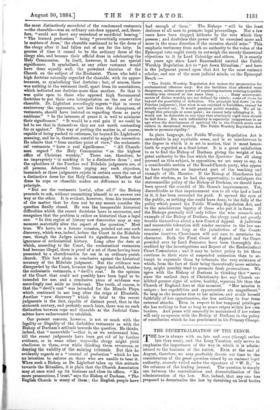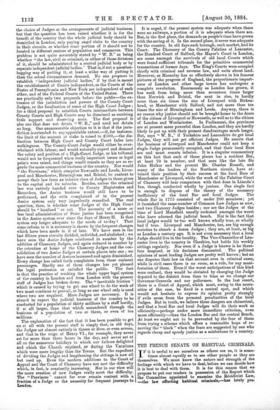THE DECENTRALISATION OF THE BENCH.
THE law is always with us, late and soon (though rather late than soon), and the Long Vacation only serves to emphasise the importance of the way in which it is admin- istered to the business of the nation. Even at the end of August, therefore, we may profitably devote our time to the consideration of the great question raised by an eminent legal authority, scarcely veiled under the signature of " W. B.," in the columns of the leading journal. The question is simply one between the centralisation and decentralisation of the administration of the law. Not, indeed, that any one has proposed to decentralise the law by devolving on local bodies
the choice of Judges or the arrangements of judicial business, but that the question has been raised whether it is for the benefit of the country that the whole judicial body should be domiciled in London, only paying angel visits to the country in their circuits, or whether some portion of it should not be located in different centres of population and commerce. This problem is not quite accurately stated by " W. B." as being whether " the law, civil or criminal, or either of those divisions of it, should be administered by a central judicial body or by separate independent judicial bodies." That is,if not a question- begging way of putting it, at least a wider way of putting it than the actual circumstances demand. No one proposes to establish "independent judicial bodies," if by that is meant the establishment of Courts independent, as the Courts of the States of Pennsylvania and New York are independent of each other, and of the Federal Courts of the United States. There are practically only two proposals before the public—the ex- tension of the jurisdiction and powers of the County Court Judges, or the localisation of some of the High Court Judges ; for a third proposal to establish Courts intermediate between County Courts and High Courts may be dismissed as receiving little support and deserving none. The first proposal is also one that does not detain " W. B.," and need not detain us long. One unanswerable objection to it is that if the juris- diction is extended to any appreciable extent,—if, for instance, the limit of the amount at stake is raised to £500,—the dis- tinction between High Court and County Court fades into nothingness. The County-Court Judge would either be over- whelmed with labour, and would naturally expect and demand the salary and position of a High-Court Judge, or his tribunal would not be frequented when really important issues or legal points were raised, and things would remain as they are as re- gards the main commercial business of the country. Nor would " the Provinces," which comprise Newcastle and Leeds, Liver- pool and Manchester, Birmingham and Bristol, be content to accept their law from an inferior class of Judges to those given to the capital and its suburbs. Besides, unless the criminal law was entirely handed over to County Magistrates and Recorders, the Assize business would still have to be performed, and the evils complained of in the present Assize system only very imperfectly remedied. The real question, then, is whether some Judges of the High Court should be " localised " or not. The necessity of a more or less local administration of State justice has been recognised in the Assize system ever since the days of Henry II. Is that system any longer adequate to the needs of to-day ? That some reform in it is necessary is shown by the frequent changes which have been made in it of late. We have seen in the last fifteen years circuits divided, redivided, and abolished ; we have seen the Assize Judges reinforced in number by the addition of Chancery Judges, and again reduced in number by the retention at home of the Chancery Judges and the con- solidation of two Assize Judges at certain places into one ; we have seen the number of Assizes increased and again diminished. Every change has called forth complaints from these eminent personages. Hardly one of these changes has yet pleased the legal profession or satisfied the public. The fact is that the practice of working the whole upper legal system of the country in London and from London with the present staff of Judges has broken down. The " inevitable friction " which is caused by trying to get one wheel to do the work of two must continue to prevail, so long as one wheel only is used where two are required. More Judges are necessary. It is absurd to expect the judicial business of the country to be conducted for a population of thirty millions by a staff hardly, if at all larger, than that which maundered through the business of a population of two or three, or even of ten millions.
The explanation of the fact that it has been possible to get on at all with the present staff is simply that, in old days, the Judges sat almost entirely in threes or fives, or even sevens, and that in the reign of Henry VI., for example, they never eat for more than three hours in the day, and never sat at all on the numerous holidays in which our fathers delighted
and which the Church enjoined, or during the Vacations which were more lengthy than the Terms. But the expedient
of dividing the Judges and lengthening the sittings is now all but used up. Even the modern additions to the Court of Appeal and the Court of Chancery have not met the difficulty
which, in fact, is constantly increasing. Nor in our view will the mere creation of new Judges really meet the difficulty. The " Provinces " cannot for ever remain content with a fraction of a Judge or the necessity for frequent journeys to London. It is urged, if the present system was adequate when there were no railways, a portion of it is adequate when there are. Bat, in the first place, the demands on people's time have grown with the saving of it. In the second place, it never was adequate for the country. In old days each borough, each market, had its Court. The Chancery of the County Palatine of Lancaster, the Hundred Court of Salford, the Mayor's Court in London, are some amongst the survivals of old local Courts which were found sufficient tribunals for the primitive commercial transactions of former days. The King's Courts were occupied chiefly with criminal and revenue law, and suits about land. Moreover, as Macaulay has so effectively shown in his famous pictures Of the progress of England, the proportionate import- ance of London and other large towns has undergone a complete revolution. Enormously as London has grown, it has sunk from being more than seventeen times larger than Norwich and Bristol, the next in size, to hardly more than six times the size of Liverpool with Birken- head, or Manchester with Salford, and not more than ten times the size of Birmingham and Leeds. Anyway, there is no reason why justice should not be brought home to the doors of the citizen of Liverpool or Newcastle, as well as to the citizen of London and Westminster. In Parliament, the provinces are at present more powerful than London, and they are hardly likely to put up with their present disadvantages much longer. But, says " W. B.," if Yorkshire and Lancashire do get local Judges, they will not get efficient Judges. He asserts that the business of Liverpool and Manchester could not keep a single Judge permanently occupied, and that their local Bars are and must remain inferior. It is a singular commentary on this fact that each of those places has a resident Bar, at least 70 in number, and that men like the late Sir John Holker and the present Mr. Charles Russell, and many of the leaders of the Northern circuit, have at- tained their position by their success at the local Bars of Manchester or Liverpool, while the work of the Palatine Court of Chancery will bear comparison with that done in Lincoln's Inn, though conducted wholly by juniors. One single fact is enough to dispose of the theory of the necessary
inefficiency of the local Bar and local Judges. The whole Bar in 1775 consisted of under 200 members ; yet it furnished the same number of Common Law Judges as now, and two Chancery Judges besides ; nor are the Judges of the time of Lord Mansfield usually reckoned amongst the worst who have adorned the judicial bench. Nor is the fact that local judges would be too well known wholly true, or wholly bad if true. Liverpool and Manchester, too, are big enough societies to absorb a dozen Judges ; they are, at least, as big as London a century ago. It is not even necessary that a local Judge should live in the locality. The Vice-Chancellor of Lan- caster lives in the country in Cheshire, but holds his weekly sittings regularly. Nor even if a Judge is known is he there- fore despised, or his decisions discounted. The political opinions of most leading Judges are pretty well known ; but no one disputes their law on that account even in criminal cases, while in civil cases there is no room, as a rule, for any mani- festation of them. Even if the worst anticipations of this kind were realised, they would be obviated by changing the Judge deputed to the district from time to time as we change our Governor-Generals and our policemen. In the last resort, there is a Court of Appeal, which must, owing to the neces- sities of the case, be fixed in a central spot, and which would not hesitate to express its opinion pretty strongly if evils arose from the personal peculiarities of the local Judges. But in truth, we believe these dangers are chimerical, and that a local Bar and local Judges will do their work as efficiently—perhaps under more immediate criticism, even more efficiently—than the London Bar and the central Bench. At least we ought not to be prevented by the fear of them from trying a scheme which offers, a reasonable hope of re- moving the " block " when the fears are suggested by one who regards cheap and speedy justice as a misfortune to a country.



































 Previous page
Previous page